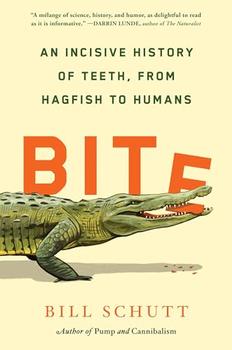
An Incisive History of Teeth, from Hagfish to Humans
by Bill Schutt
From three-inch fang blennies to thirty-foot prehistoric crocodiles, from gaboon vipers to Neanderthals, Bite is a fascinating journey through the natural, scientific, and cultural history of something right in front of—or in—our faces: teeth.
In Bite, zoologist Bill Schutt makes a surprising case: it is teeth that are responsible for the long-term success of vertebrates. The appearance of teeth, roughly half a billion years ago, was an adaptation that allowed animals with backbones, such as fish, amphibians, reptiles, birds, dinosaurs and mammals—including us—to chow down in pretty much every conceivable environment.
And it's not just food. Tusks and fangs have played crucial roles as defensive weapons—glimpsing the upper canines of snarling dogs is all it takes to know that teeth are an efficient means of aggression. Vampire bats use their razor-sharp teeth to obtain a widespread but generally untappable resource: blood. Early humans employed their teeth as tools to soften tough fibers and animal hides. Our teeth project information and social status—the ancient Etruscans were the first to wear tooth bling, and it's doubtful that George Washington would have been elected president without the false teeth he wore.
So much of what we know about life on this planet has come from the study of fossilized teeth, which have provided information not only about evolution but also about famine, war, and disease. In his signature witty style, the author of Pump and Cannibalism shows us how our continued understanding of teeth may help us humans through current and future crises, from Alzheimer's disease to mental health issues. Bite is popular science at its best and will appeal to readers of Mary Roach, Merlin Sheldrake, and Ed Yong.
"A lively, deeply informed investigation of the origin, development, and significance of teeth...Schutt's purview is wide ranging and his curiosity insatiable... A fascinating romp through evolutionary history." ―Kirkus Reviews (starred review)
"Schutt's tone is dryly funny, and his conversational prose reads as if an erudite friend were explaining their life's passion over drinks. Pop science aficionados will want to sink their teeth into this." ―Publishers Weekly
"Zoologist Schutt enthusiastically and wryly polishes the profile of dentition, including fangs and tusks...Plenty of interesting material for readers to sink their teeth into." ―Booklist
"Another tightly focused book to chew on." ―AARP
"Who knew hagfish could be so interesting? Bite ranges across millions of years of evolution as Schutt explores the surprising importance of these stony nuggets inhabiting the mouths of animals. His writing is a mélange of science, history, and humor, as delightful to read as it is informative. Including a cast of quirky scientists as well as sharks, narwals and even George Washington, Schutt makes it all very accessible." ―Darrin Lunde, author of The Naturalist
"Bite is a comprehensive jaunt through comparative biology, history, and popular culture regarding those critical itty bits. Worth sinking your teeth into." ―Roy A. Meals, MD, author of Bones and Muscle
This information about Bite was first featured
in "The BookBrowse Review" - BookBrowse's membership magazine, and in our weekly "Publishing This Week" newsletter. Publication information is for the USA, and (unless stated otherwise) represents the first print edition. The reviews are necessarily limited to those that were available to us ahead of publication. If you are the publisher or author and feel that they do not properly reflect the range of media opinion now available, send us a message with the mainstream reviews that you would like to see added.
Any "Author Information" displayed below reflects the author's biography at the time this particular book was published.
Bill Schutt is a vertebrate zoologist and author of six nonfiction and fiction books, including Pump: A Natural History of the Heart and the New York Times Editor's Choice, Cannibalism: A Perfectly Natural History. Recently retired from his post as professor of biology at LIU Post, he is a research associate at the American Museum of Natural History, where he has studied bats all over the world. His research has been featured in Natural History magazine as well as in the New York Times, Newsday, the Economist, and Discover.




A classic is a book that has never finished saying what it has to say
Click Here to find out who said this, as well as discovering other famous literary quotes!
Your guide toexceptional books
BookBrowse seeks out and recommends the best in contemporary fiction and nonfiction—books that not only engage and entertain but also deepen our understanding of ourselves and the world around us.